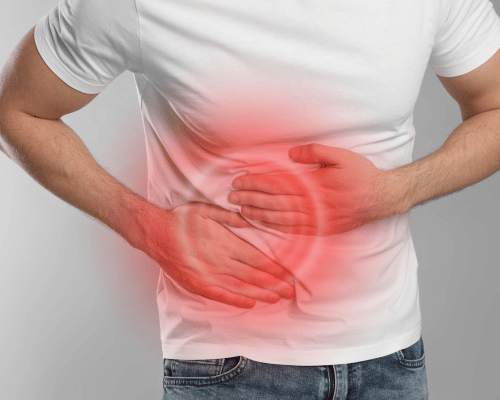Appendicitis Treatment In Bangalore

What is Appendicitis?
Appendicitis is a condition where the appendix becomes swollen, painful, and infected. It usually begins with pain near the belly button, which then moves to the lower right side of the abdomen.
If not treated quickly, the appendix can burst and cause a serious infection inside the abdomen.
Dr. Varun Kumar J, an experienced Laparoscopic and General Surgeon in Bangalore, provides advanced and safe treatment for appendicitis with minimal pain and faster recovery.
Symptoms
Recognizing the symptoms of this condition is essential for timely treatment. Common symptoms include:
- Sudden pain starting near the belly button and moving to the right lower abdomen
- Pain that worsens with movement, coughing, or touching the area
- Nausea or vomiting
- Loss of appetite
- Fever
- Bloating or gas
- Constipation or diarrhoea
Do You have any of these Appendicitis Symptoms?
Causes of Appendicitis
Appendicitis occurs when the appendix gets blocked, which allows bacteria to grow inside. Common causes include:
- Hard stool blocking the appendix
- Swelling of the intestinal lining
- Infection in the digestive tract
- Tumours (rare)
- Enlarged lymph nodes
When to See a Doctor
Seek immediate medical attention if you experience:
- Severe abdominal pain lasting more than a few hours
- Pain that becomes sharper on the right lower side
- Fever with abdominal pain
- Vomiting that doesn’t stop
- Abdominal swelling
- Inability to pass gas or stool
Appendicitis is a medical emergency – delaying treatment may lead to the appendix bursting.
Risk Factors
While appendicitis cannot always be prevented, some steps can reduce the risk:
- Age between 10 and 30 (most common)
- Family history of appendicitis
- Frequent stomach infections
- Low-fibre diet
- Digestive disorders
Complications
If untreated, appendicitis can lead to:
- Bursting (rupture) of the appendix
- Severe abdominal infection (peritonitis)
- Formation of pus-filled abscess
- Blockage of the intestines
- Longer hospital stays and complicated surgeries
Early treatment prevents these complications.
Diagnosis
Diagnosing appendicitis requires careful evaluation because symptoms can sometimes look like other stomach problems. Dr. Varun Kumar J uses a combination of physical examination and tests to make an accurate diagnosis.
- Physical Examination:
The doctor checks for tenderness, swelling, and severe pain in the lower right abdomen. - Blood Tests:
These help identify infection or inflammation in the body. - Urine Test:
Used to rule out kidney stones or urine infections that may cause similar pain. - Ultrasound Scan:
Helps detect an enlarged appendix or signs of infection. - CT Scan:
Provides a detailed picture and confirms appendicitis in unclear cases.
Early diagnosis ensures timely and safe treatment.
Appendicitis Treatment In Bangalore
Appendicitis requires urgent medical treatment. Surgery is the most effective and permanent solution.
- Laparoscopic Appendicectomy (Keyhole Surgery):
This is the preferred treatment. Three small cuts are made and a camera helps the surgeon remove the appendix safely.
It causes less pain, minimal scarring, and faster recovery. Most patients go home within 24–48 hours and return to normal activities in a week. - Open Surgery:
Required if the appendix has already burst or if there is severe infection. A larger incision is made to clean the infected area thoroughly. - Antibiotics:
Used to control infection in early or mild cases, or before surgery. But medicines cannot permanently cure appendicitis.
Surgery is usually recommended to prevent the risk of rupture.
Lifestyle and Home Remedies
Lifestyle changes cannot cure appendicitis, but they may help reduce discomfort before diagnosis or during recovery.
- Eat light, soft foods if nausea is present
- Drink plenty of fluids
- Avoid heavy or oily meals
- Do not apply heat to the abdomen (it can worsen inflammation)
- Rest and avoid heavy activity after surgery
These steps are supportive and not a replacement for medical treatment.
Myths and Facts of Appendicitis
Myths
- Appendicitis always causes severe pain.
- Only children and young adults get appendicitis.
- Eating seeds causes appendicitis.
- Appendicitis pain is always on the lower right side.
- Surgery is the only treatment for appendicitis.
Facts
- Some cases may present mild or atypical symptoms.
- Appendicitis can occur at any age.
- There is no scientific evidence linking seeds to appendicitis.
- Pain can start near the navel and move to the lower right abdomen.
- While surgery is the standard treatment, antibiotics may be used in some cases.
Conclusion
Appendicitis is a dangerous illness that has to be treated right away. With Dr. Varun Kumar J’s expertise and compassionate care, you can trust that you will receive the best possible treatment.
Our advanced laparoscopic techniques, state-of-the-art facility, and personalized approach ensure a safe and effective recovery.
Don’t hesitate to seek medical help if you suspect appendicitis – early treatment is key to avoiding complications.
Click here to Book your consultation today!!

FAQs
The first signs typically include abdominal pain near the navel that shifts to the lower right abdomen, along with nausea, vomiting, and fever.
Appendicitis is diagnosed through physical exams, blood tests, and imaging tests such as ultrasound or CT scans.
In some cases, antibiotics can be used to treat mild appendicitis, but surgery is usually required to prevent recurrence.
Recovery time varies, but most people can return to normal activities within 1-3 weeks after laparoscopic surgery and 2-4 weeks after open surgery.
There is no clear hereditary link, but having a family history of appendicitis may increase the risk.
Untreated appendicitis can lead to a ruptured appendix, causing severe infections like peritonitis or abscess, which are life-threatening.
